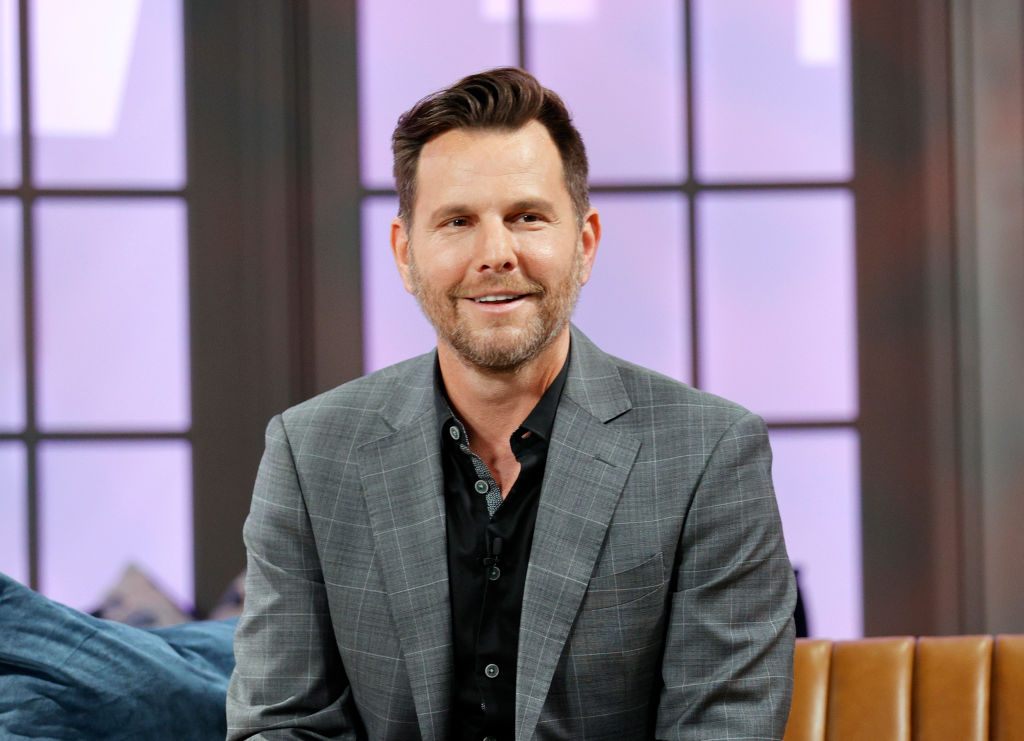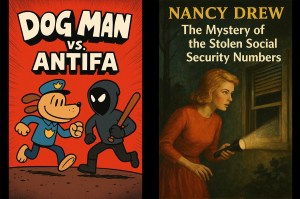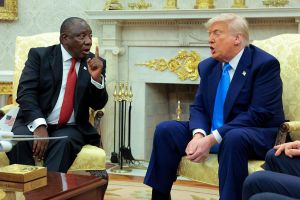I didn’t want to review Dave Rubin’s Don’t Burn This Country. One Dave Rubin book seemed like enough — arguably too many — for a lifetime. Yet like a burglar who retires from his life of crime only to pass a mansion with its doors wide open and the glint of jewels beyond the hallway, I was pulled in again. Just one more job.
In case anyone has never heard of Mr. Rubin, he is an interviewer and commentator who began as a mildly left-wing contributor to the Young Turks and then drifted towards the “anti-woke” realms of the “Intellectual Dark Web,” where his talk show became a hub of the phenomenon as he interviewed anyone and everyone who didn’t like “safe spaces” and blue-haired transsexuals. As Donald Trump ascended to the presidency, Rubin became a more partisan pro-MAGA commentator.
What makes Rubin such a funny public figure is that he has built his reputation on his passion for “ideas,” yet he treats them like a cat might treat a fragile ornament. He is no more able to grasp complex ideas than I would be able to deadlift 500 pounds. In this new polemic, for example, he writes:
Put simply, the Left is for collectivism and judgment based on group identity; the Right is for individual thought, individual expression, and personal liberty.
Smash. Oh dear. Let us grant that this has been more true in the United States than it has been in Europe. Still, where would the conservatisms of Russell Kirk and Brent Bozell and Pat Buchanan fit? Does Rubin’s précis have space for the modern “new right“? That “simply” should be “simple-mindedly.”
Rubin is constantly, interminably buttering up right-wingers without displaying much understanding of their beliefs. He says:
I find the Right to be exponentially more tolerant, way more respectful toward individuals, way more supportive of individual thought, way more interested in diversity, way more progressive, way more inclusive, and honestly, just a way more fun side. The Right is a toga party with a bunch of people drinking and smoking and sharing different and often competing ideas.
Oh, yeah, it’s a regular hugbox over here. That’s why William F. Buckley and Ayn Rand got on so famously, and why Sohrab Ahmari and David French are such good pals.
When in doubt — be it related to what he believes or what his readers want to hear — Rubin is comfortably vague. A passage on religion hails “the eternal truths told for thousands of years through historical and biblical stories.” But what truths? Er, “the ideals of freedom and equality.” I’m not faulting Rubin for being agnostic. I am as well. I’m faulting him for pretending that he has said anything.
In a word, this book is lazy. It reads like Rubin sat down and wrote down whatever happened to pop into his head over the course of a couple of rainy afternoons. A few sources have informed it. The section about progressives is a slapdash account of the ideas of James Lindsay and Helen Pluckrose. The section on economics is a slapdash account of the work of Thomas Sowell (thank God that obscure, marginal thinker has now been exposed to a wider audience). This would be forgivable if Rubin wrote in clear, entertaining prose, but he does not. Summarizing Lindsay and Pluckrose on critical theory, for example, Rubin writes:
When these principles are applied, consequences often occur: boundaries get blurred, specialized language becomes a tool, truth becomes subjective, and the individual disintegrates.
What kind of consequences? When is specialized language not a tool? What does it mean for the individual to “disintegrate”? Knowing the context, we have some idea of what Rubin is getting at, but his prose is a hindrance rather than a help.
I could pick out examples all day. Dismissing ideas of universal healthcare, Rubin writes, “The assumption that an institution is meant to solve anything is the reason nothing ever gets solved at all.” He makes another disparaging reference to “man-made institutions” a couple of sentences afterwards. Dave, I hate to break it to you, but insurance companies? They’re institutions!
You’re never quite sure, as you effortfully convince yourself to turn the pages of this book, what is bad writing and what is bad thinking. In his very, very vague passage about God, Rubin says, “I was always one who favored knowledge over belief.” Belief is not an antonym of knowledge. We believe, in many cases, because of what we know.
What about Rubin’s storytelling? He has met some interesting people and been at the heart of some interesting events. Lazily, he recycles an uninteresting story about a time he and his husband met Donald Trump, who loudly told them there was nothing wrong with being gay. For Rubin, “his forwardness was likely because he thought that we thought he was a homophobe.” It’s typically unlike Donald Trump to be forward so I’m sure it would have taken the self-consciousness he is so famed for to inspire such a comment.
Rubin writes about how his talk show developed, ending with a triumphant flourish:
Having genuine, open, and honest conversations with people thinking similar, albeit unpopular, thoughts helped me feel a little less crazy — a little less alone. Thus, the “Intellectual Dark Web” was born in my 24 x 22-foot garage.
What do you suspect contributed more to the development of the Intellectual Dark Web? The Rubin Report or The Joe Rogan Experience? It is interesting, now that I come to think of it, that a book about “woke” nonsense, alternative media and self-reliance doesn’t mention Rogan once. Perhaps it is because Joe stopped inviting him on.
I realized, though, as Rubin discussed creating his show and his social media platform Locals, what I find interesting about him. Rubin has achieved something that I should find admirable. He has built a gloriously successful career out of very, very little. I’m sure that took an enormous amount of hard work, ingenuity and risk. That is impressive. But he did it with depressingly little attention to the quality of his work. This is an objectively lazy book, in its style and in its substance. No amount of hard work that took him to the point where he could get away with writing such a book can change that fact. Such indifference to stylistic and intellectual quality is what makes his professional virtues hard to admire. Would you admire someone who built a restaurant from scratch if their food tasted like crap?
Rubin is too rich and famous to care about what I think. (That wealth and fame is what prevents me from feeling bad about being a bit mean.) But if you want to accomplish something through the many alternative avenues available to us, I implore you to care about quality as well as success. Do I always live up to that? Heavens no. But I should. Mr. Rubin’s book is a case study in what not to do.

























